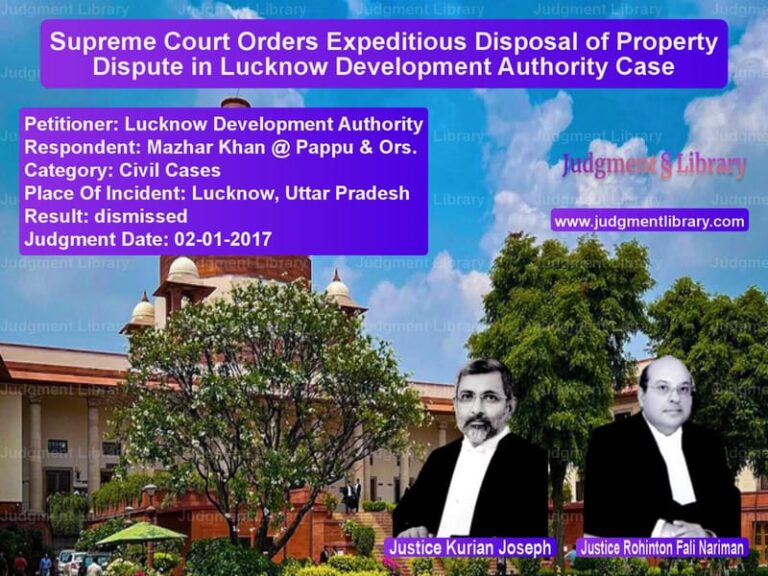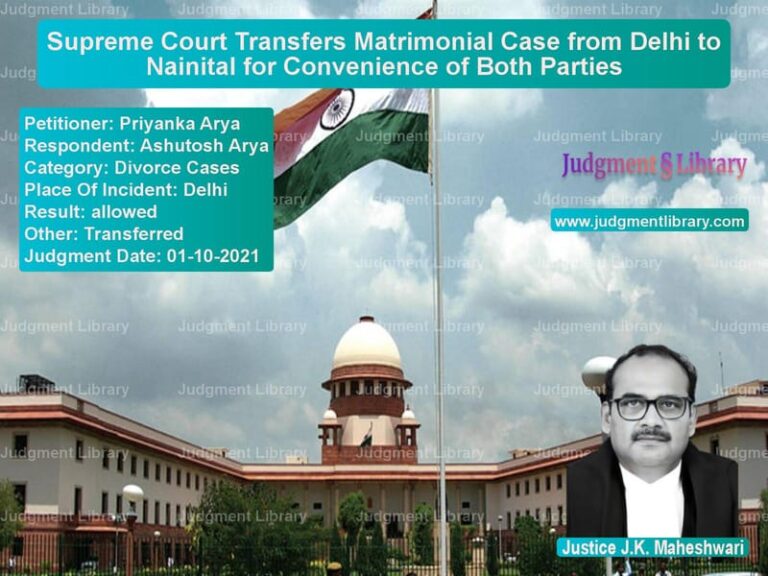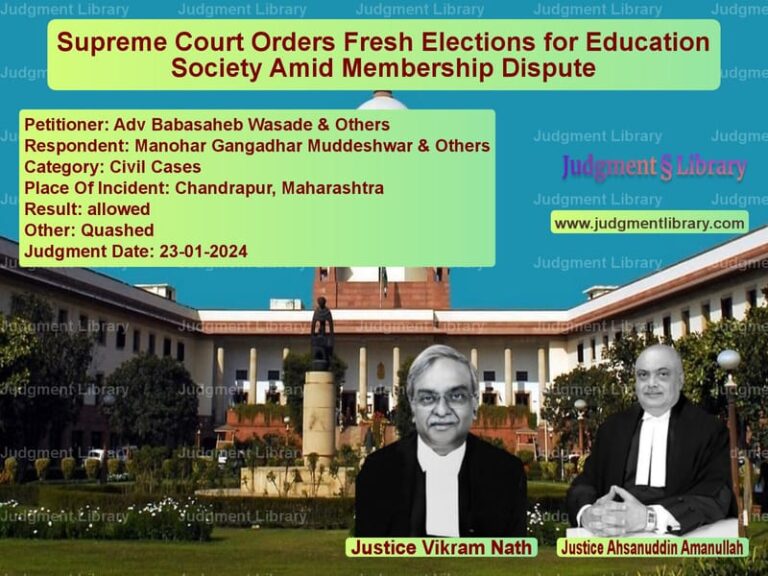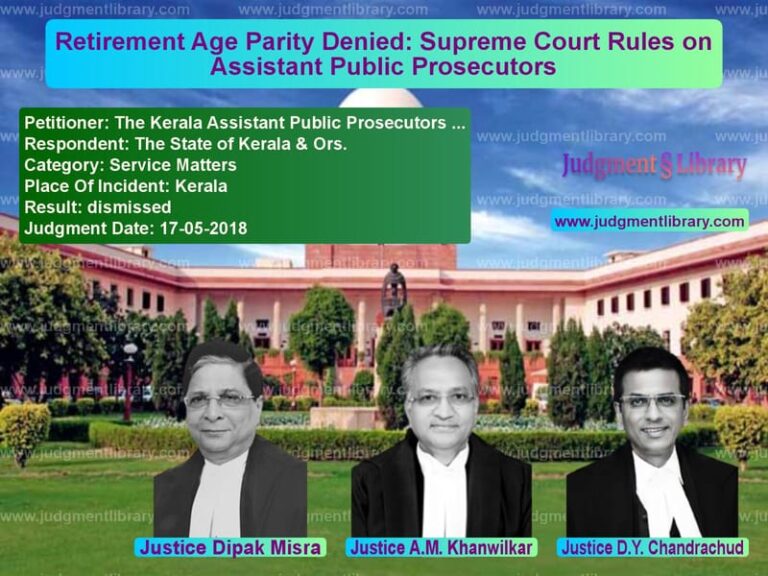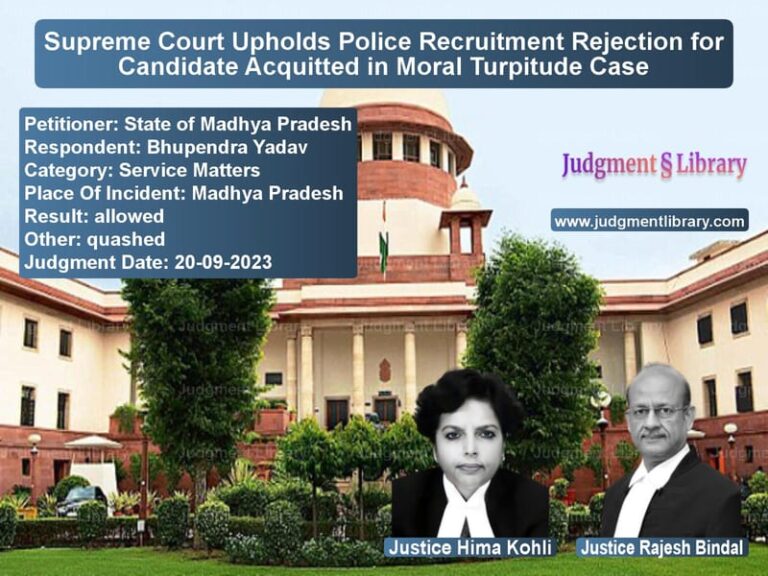Supreme Court Ruling on Political Murder: Conviction Upheld, Acquittals Reversed
The Supreme Court of India recently delivered a significant verdict in the case of Jafarudheen & Ors. vs. State of Kerala, a politically charged murder that took place in 2002. The case revolved around a violent altercation between members of two rival political parties—CPI(M) and NDF (National Development Front)—leading to the brutal killing of a CPI(M) member. This judgment not only reaffirmed the convictions of several accused but also reversed the acquittals of four others.
Background of the Case
The events of this case unfolded on July 17, 2002, when the deceased, a member of CPI(M), had a heated argument with NDF members, reportedly assaulting one of them. That same evening, a group of 16 accused assembled at the residence of one of the co-accused and allegedly conspired to eliminate the deceased.
The very next night, on July 18, 2002, at around 9:30 PM, armed with deadly weapons such as swords and knives, the accused stormed the victim’s residence. Nine members of the group entered the house, while four others waited outside. The attack was brutal, and the accused also exploded country bombs during the assault.
The attack was witnessed by multiple people, including the victim’s relatives, domestic workers, and neighbors, some of whom later became key witnesses in the case. The police registered an FIR on the same night, charging the accused under various sections of the Indian Penal Code (IPC) and the Explosive Substances Act.
Trial and High Court Proceedings
The trial court convicted five of the accused—A-2, A-4, A-5, A-8, and A-9—under multiple sections of IPC, including Section 302 (murder) and Section 149 (unlawful assembly). They were sentenced to life imprisonment. However, A-10 to A-13 were acquitted due to inconsistencies in witness testimonies.
The Kerala High Court upheld the convictions of the five accused but overturned the acquittals of A-10 to A-13, ruling that the prosecution had provided enough evidence to prove their involvement.
Supreme Court Judgment
The case was taken to the Supreme Court, where the convicted accused argued that the prosecution’s case was flawed due to delays in filing the FIR, inconsistencies in witness statements, and questionable evidence regarding their identification.
Arguments by the Petitioners
- The FIR was registered at 11:00 PM on the same night but only reached the Magistrate at 4:15 PM the next day, creating suspicion about possible manipulation.
- The prosecution’s witnesses were either relatives of the deceased or politically affiliated, making their testimonies biased.
- The identification of A-10 to A-13 by some witnesses was unreliable due to discrepancies in their statements.
- The alleged recovery of weapons was not conclusively linked to the accused.
Arguments by the State
- The prosecution presented multiple eyewitnesses who directly implicated the accused.
- Medical evidence corroborated the nature of injuries described by the witnesses.
- The accused were apprehended based on credible information, and their recoveries confirmed their involvement.
- The delays in FIR submission were procedural and did not affect the case’s merits.
Supreme Court’s Key Findings
Upholding the Convictions
The Supreme Court affirmed the convictions of A-2, A-4, A-5, A-8, and A-9, stating that there was sufficient corroboration between witness testimonies, forensic reports, and other evidence.
“The trial court considered the evidence of eyewitnesses, experts, and forensic reports before arriving at the verdict. There is no reason to interfere with these findings.”
Reversing the Acquittals
The Supreme Court ruled that the High Court had erred in overturning the acquittals of A-10 to A-13. The trial court had correctly observed inconsistencies in witness statements regarding these accused, and their alleged presence at the crime scene was not conclusively established.
“To attract Section 149 IPC, the prosecution must prove common object. The trial court rightly held that the evidence against A-10 to A-13 was insufficient.”
Addressing the FIR Delay
The Court acknowledged the delay in the FIR reaching the Magistrate but ruled that it was not significant enough to nullify the case.
“While the delay in submission of the FIR must be scrutinized, it alone cannot be a reason to discard otherwise reliable evidence.”
Impact of the Judgment
- Legal Clarity on Section 149 IPC: The judgment reinforces that common object under unlawful assembly must be proved beyond doubt.
- Importance of Witness Reliability: The case highlights how courts scrutinize inconsistencies in witness testimonies.
- FIR and Procedural Delays: The ruling clarifies that procedural delays do not automatically discredit a prosecution case.
- Balance Between Acquittal and Conviction: The Court upheld the need for due diligence in reversing acquittals.
Conclusion
The Supreme Court’s ruling in Jafarudheen & Ors. vs. State of Kerala is a crucial precedent in criminal jurisprudence. It underscores the importance of strong evidence in murder trials, the role of Section 149 IPC in unlawful assembly cases, and the balance courts must maintain in reviewing acquittals. While the convictions of the five main accused were upheld, the acquittals of four others were restored, reinforcing the principle that justice must be served based on the weight of evidence rather than procedural technicalities.
Petitioner Name: Jafarudheen & Ors..Respondent Name: State of Kerala.Judgment By: Justice Sanjay Kishan Kaul, Justice M.M. Sundresh.Place Of Incident: Kerala.Judgment Date: 22-04-2022.
Don’t miss out on the full details! Download the complete judgment in PDF format below and gain valuable insights instantly!
Download Judgment: jafarudheen-&-ors.-vs-state-of-kerala-supreme-court-of-india-judgment-dated-22-04-2022.pdf
Directly Download Judgment: Directly download this Judgment
See all petitions in Murder Cases
See all petitions in Attempt to Murder Cases
See all petitions in Custodial Deaths and Police Misconduct
See all petitions in Judgment by Sanjay Kishan Kaul
See all petitions in Judgment by M.M. Sundresh
See all petitions in partially allowed
See all petitions in Modified
See all petitions in supreme court of India judgments April 2022
See all petitions in 2022 judgments
See all posts in Criminal Cases Category
See all allowed petitions in Criminal Cases Category
See all Dismissed petitions in Criminal Cases Category
See all partially allowed petitions in Criminal Cases Category


